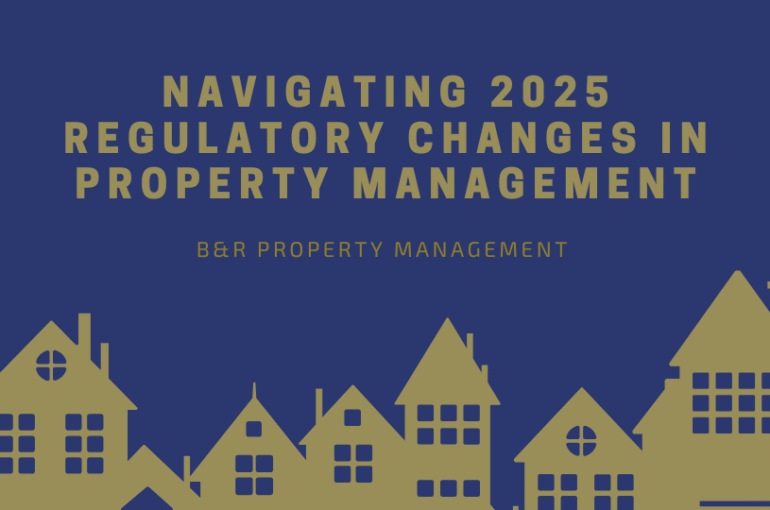Navigating 2025 Regulatory Changes in Property Management
Navigating 2025 Regulatory Changes in Property Management

Key Takeaways
- HOTMA compliance extended – Landlords with HUD-assisted properties now have until January 2026 to meet new income and asset documentation requirements.
- Fair housing rules revised – HUD now allows self-certification of compliance, but stricter protections may return, so landlords must stay alert.
- AI in property management is regulated – Tools used for tenant screening, advertising, or scheduling must be non-discriminatory and transparent under Fair Housing Act guidelines.
- Tenant protections and rent control strengthened – Eviction processes are more restrictive, and many states now cap annual rent increases (some at 10% or lower).
- Sustainability and transparency required – Landlords must meet energy efficiency standards and provide clear disclosures on rent increases, fees, and security deposit deductions to build tenant trust.
Landlords and property managers should carefully navigate the property management landscape. These changes cut across the national level, state, and local levels. 2025 ushered in its wave of regulatory changes, making it more complex than before.
However, when you understand these changes and the implications, you will appreciate the need to stay compliant while enjoying your profitable investment.
Property managers and owners who adapt their operations accordingly have a competitive advantage in recent real estate markets.
In this article, B&R Property Management will discuss some key regulatory changes in property management for 2025 and how landlords and property managers can navigate them.
Regulatory Changes in Property Management
1. Housing Opportunity Through Modernization Act (HOTMA)
This act has had several compliance deadline extensions. Initially, it was scheduled to take off on 1st January 2025. Later, it was postponed to 1st July 2025.
Currently, the compliance has been extended to 1st January 2026. That means landlords have extra time to implement all the required updates for documenting income and assets classified as HUD-assisted properties.
2. Fair Housing Regulations
There has been a substantial revision of the fair housing regulation. The HUD releases an interim final rule in February 2025. This rule simplified Affirmatively Furthering Fair Housing requirements.
As a result, instead of submitting detailed fair housing plans, grantees can now self-certify their compliance. This change is aimed at reducing administrative burdens while promoting fair housing practices at the same time.

It is essential to remember that the regulatory environment is still fluid because of the continuous efforts by Congress to bring back strict fair housing protection policies.
3. The Use of Artificial Intelligence
Since most apartment operators have adopted artificial intelligence-enabled screening technologies that will ease the leasing process, the Department of Housing and Urban Development has released a new guideline on using artificial intelligence.
Landlords who use artificial intelligence to advertise, screen tenants, and schedule maintenance are expected to ensure that their artificial intelligence tools comply with the Fair Housing Act and do not discriminate against tenants in the protected classes.
The Artificial intelligence tool used should offer a clear explanation of the processes used in making decisions.
4. Enhanced Tenant Protections
This year, tenant protection laws have been expanded and redesigned for fairer housing practices. As a result, the regulations are now strict on eviction processes.
This is to ensure that renters have enough time to get alternative accommodation. It is advisable that you review your procedures and policies to align with these new regulations. Doing so will prevent you from incurring fines and legal disputes.
5. Sustainability Standards and Energy Efficiency
Because of environmental concerns, sustainability standards for rental properties are now stricter. In some states, it is now mandatory to provide energy-efficient upgrades, including water-saving features, LED lighting, and modern HVAC systems.
They also offer tax incentives to landlords who upgrade their property to meet these energy efficiency standards.

Landlords are expected to make these eco-friendly investments not just because it is mandatory, but because it will enhance their value, boost marketability, and appeal to renters who prioritize environmental sustainability.
6. Transparency Requirements
In most places, landlords are required to provide itemized receipts for deductions of security deposits, detailed explanations for increasing rents, and prior disclosure about property conditions or fees.
Survey reports from the National Multifamily Housing Council showed that 65% of renters prefer landlords who are transparent in their business. This highlights that transparency leads to trust and tenant satisfaction.
7. Rent Control Adjustments
Most states have updated their rent control policies for 2025. This is to solve the current housing affordability issues. In some states, most properties have a rent control cap that only allows for an annual rent increase of 10%.
This varies with different regions and areas, as they may have stricter rules with additional limits. All these are aimed at balancing tenant protections with the financial needs of landlords.
Steps for landlords to navigate 2025 regulations
Although adapting to these new regulations can be stressful, taking proactive measures will simplify the process. Below are a few tips you may use to ensure that you remain compliant with the new regulations:
Get Advice From Experts
It is advisable to hire the services of local property managers who are well-skilled in navigating these processes. They will guide and advise you on how to proceed so that you do not make expensive mistakes.

Another expert you should have among your team is a legal advisor who specialises in landlord-tenant laws. If possible, get a local one in the neighborhood where your property is located. They will guide you to ensure full compliance.
Stay Updated
From time to time, always review regulatory publications and look out for current requirements. Consult appropriate legal resources and attend seminars, conferences, and webinars where these current property management regulations are discussed. Doing so will keep you informed.
Review Lease Agreements
Ensure that you always review your lease agreements and make changes to reflect new regulations. By doing so, you will keep up with current legal standards.
Train Your Team
To ensure that you are fully compliant, you will need to involve your team in the recent changes. If they also understand current regulatory requirements, implementing them will be smooth.
Tenant Communication Strategies
Engage in proactive and clear communication with your tenants. Ensure that you inform and educate your renters about their recent obligations and expectations in line with the current regulations.
Final Words
As governments continue to respond to technological advancements, changing priorities, and housing affordability concerns, property management regulations will keep evolving both locally and nationally.
At B&R Property Management, we help landlords navigate complex compliance requirements while keeping their investments profitable.
With expert guidance, proactive management, and a deep understanding of evolving regulations, we ensure your properties remain protected, profitable, and positioned for long-term success.
Contact us today to learn how we can help you adapt with confidence.



